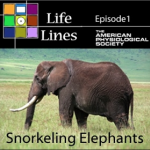Social Sciences
A couple of "kids these days are bad at math" stories crossed my feed reader last week, first a New York Times blog post about remedial math, then a Cocktail Party Physics post on confusion about equals signs. The first was brought to my attention via a locked LiveJournal post taking the obligatory "Who cares if kids know how to factor polynomials, anyway?" tack, which was obvious bait for me, given that I have in the past held forth on the importance of algebra for science students (both of these are, at some level, about algebra).
Of course, these articles aren't about science students, so…
It is possible that a much earlier than previously known date for the use of flaked stone tools has been established in Ethiopia, dating to prior to 3.39 million years ago.
A paper just out in Nature by McPherron et al suggests that a set of marks found on two bones recovered from the surface very near a locality for which an estimated date can be obtained were caused in antiquity by stone tools wielded by hominids. The date predates any prior known chipped stone tool artifacts of the kind that would leave such marks. The absence of chipped stone tools in the archaeological record in which…
How to get from atheism to the complete extinction of the human race:
(via somewhere on here)
Dr. Isis is reconsidering the work-life balance issues with her usual thoughtfulness over at her blog, following on a longer conversation about the ways that this problem is (unfairly, obviously) shunted exclusively onto women. This is something I agree with - and I think her "Sack up, Dudes" is probably the most concise and accurate answer to the problem of inequities between men and women in the home.
As much as I totally agree with Isis that the shifting of the problem onto women is just plain old wrong (and it should be obvious that this is not something that happens in my house (if…
My Synthetic Aesthetics partner, Sissel Tolaas, is featured in the terrific current issue of the German interview magazine mono.kultur. Her work focuses on smell, exploring the unique smellscapes of different cities, creating provocative scents to show in art galleries, branded "logo" scents for Adidas, "Swedish" scents for Ikea, and therapeutic memory-triggering scents, part of the healing process for patients dealing with traumatic experiences. Until we have smell-o-vision, her work is almost aggressively analog--"beyond what is seen and heard to something indiscernible yet more…
This is my first blog, so bear with me. I asked a friend of mine how I should begin it, and he said, "tell them why they should care about what you will write about." Fair enough.
I teach at a major university in the west. My area of specialty is the comparative physiology of glucose and fatty acid regulation. I specialize in this area because diabetes is such a prevalent concern in the United States. I accepted the invitation to blog on comparative physiology in the hopes that the discussion about this branch of science could grow broader and deeper via the blogosphere. For others thirsting…
Spiegel has a wonderful interview with Venter. The more I hear from Venter, the more I like him; he's very much a no-BS sort of fellow. He's the guy who really drove the human genome project to completion, and he's entirely open about explaining that its medical significance was grossly overstated.
SPIEGEL: So the significance of the genome isn't so great after all?
Venter: Not at all. I can tell you from my own experience. I put my own genome on the Internet. People had the notion this was the scariest thing out there. But what happened? Nothing.
There really was a lot of hysteria in the…
I've been interested forever in human perceptions of risk and culturally mediated fear. I got to work with some of the cook risk perception people at the Kennedy School of Government for a while (as a bystander), and as an archaeologist, I find the question of risk and fear important in human foraging (and other) decisions. For instance, humans can specialize or not as foragers, and they can include or exclude certain kinds of resources. Did early humans in southern Africa avoid dangerous bovid prey and prefer allegedly less dangerous antelopes? Did various groups that avoid fishing (East…
slacktivist: To bigotry no sanction
"During Washington's presidency, of course, most Americans did not "possess alike liberty of conscience and immunities of citizenship." The man who wrote "to bigotry no sanction" also imagined he had the right to own other humans and the authority to vote on Martha's behalf. But yet we can see here in Washington's own words the inevitable, inexorable trajectory leading toward the 13th, 14th, 15th and 19th Amendments.
Deprive any minority -- whether a religious minority, an a-religious minority, a disenfranchised gender or ethnic group or race or sexual…
Why tenure won't disappear, just shrink § Unqualified Offerings
"1) Did you notice the part where I said I'd want a higher salary to compensate for having less security? Yeah. See, lots of people are willing to slave away in grad school and postdoc positions and adjunct positions in exchange for a shot at the tenure lottery. Dilute the value of the prize, and suddenly people start wanting more money in return. A lot of smart, highly-educated people will start looking at other white collar career paths if academia doesn't provide a shot at life-long security, or at least higher pay…
The Dean Dad is worried about remedial math:
In a discussion this week with someone who spends most of her time working with students who are struggling mightily in developmental math, I heard an argument I hadn't given much thought previously: students who have passed algebra and even pre-calc in high school frequently crash and burn when they hit our developmental math, because the high schools let them use calculators and we don't.
[...][P]art of me wonders if we're sacrificing too much on the altar of pencil and paper. It's great to be able to do addition in your head and long division on…
Changing the conversation about climate change: Graduate students from American and George Mason Universities prepare interview tent on the National Mall.
WASHINGTON, DC -- How do Americans respond when they are asked to reflect on the public health risks of climate change and the benefits to health from mitigation-related actions? In other words, if we were to re-frame climate change in terms of localized impacts that people personally experience and can understand--such as vulnerability to extreme heat or poor air quality--could we shift public thinking on the issue? Those are the…
There's one thing I like to emphasize to people who complain that this blog exists only to "bash 'alternative' medicine," and that's that it doesn't. This blog exists, besides to champion science and critical thinking (and, of course, to feed my ravenous ego), in order to champion medicine based on science against all manner of dubious practices. Part of that purpose involves understanding and accepting that science-based medicine is not perfect. It is not some sort of panacea. Rather, it has many shortcomings and all too often does not live up to its promise. Our argument is merely that,…
I posted the Copenhagen Declaration here a while back. Atheist Ireland has done the right thing by taking it as a starting point and producing a simpler, and they hope clearer version. This is exactly what the motley hordes of the godless need to do: don't expect one document to encompass everything exactly as everyone wants, because that will never happen. Tweak it so it fits your ideals.
We support this amended version of the Copenhagen Declaration on Religion in Public Life. We invite other people and groups to also support it.
Personal Freedoms
Freedom of conscience, religion and belief…
The first thing you need to know about my farm is that it is huge. I mean enormous - by world standards. The vast majority of the world's farms - more than 80%, are very small farms, of less than 2 hectares (about 5 acres), and they produce the majority of the world's staple crops and calories.
I suspect most folks in most of the Global North will find that a little surprising. The term "farm" in the US tends be applied most often to very large farms. We have a strong internal sense that small scale agriculture is particularly unsuited to growing staples. Most small farms in the US…
The idea that the Bible should be interpreted as a metaphor is a good one — because it melts the superstition away.
The metaphor is a powerful tool: it allows a new idea to be expressed in old and familiar terms as an aid to comprehension, and it also allows the lumbering in of a freight of emotion that can add resonance to the ideas. I use them, everyone uses them, I believe the authors of the Bible used them heavily, and they're great; without them, you're left with simple literal descriptions, turning a literary effort into a textbook.
To some people, though, metaphors are anathema. The…
This article is in early view at JASIST. It looks like it comes from the author's dissertation. It isn't terribly earth-shattering, but it's well done, it provides more evidence, and there are definitely some implications for library/IR manager practice. Here's the citation:
Kim, J. (2010). Faculty self-archiving: Motivations and barriers Journal of the American Society for Information Science and Technology DOI: 10.1002/asi.21336
The author went through a complicated process to identify 1,500 faculty members at 17 research institutions with DSpace IRs (not immediately clear why only DSpace…
The back and forth here in comments and at Jason Rosenhouse's blog has been interesting and stimulating in the last few days. The question of how the rise of New Atheism will or has changed public attitudes towards evolution, towards religion, and towards atheism/atheists are all important questions that have extracted gallons of ink from a lot of bloggers and book authors. But to date, I know of no attempts to measure those effects scientifically. This is odd, since all the advocates on all sides are heavily invested in science as a way of knowing about the world.
Part of the problem is…
Over the weekend, the skeptics gathered at James Randi's annual The Amazing Meeting, or TAM. By all accounts, it was a great show. Probably the most buzz came from a talk by Phil Plait, which became known as the "don't be a dick" speech, because, well, he argued that skeptics will be most effective when they aren't dicks.
As I wasn't there, I couldn't comment on the speech, but twitter exploded over it. A surprising number of PZ Myers' fans seemed to think Plait was talking about PZ, though PZ wasn't mentioned. Interesting, that PZ's supporters either think he's a dick, or think other…
If you do, now is when you should do something about it. The Planetary Society is asking for Americans to contact their Senators, RIGHT NOW.
It's time to make phone calls to support space exploration. We're sending the following letter to all our members today, and urge everyone reading this to pick up the phone and take action. I've already made my phone calls.
The NASA budget is coming to a critical vote tomorrow, July 15, by the U.S. Senate Committee on Commerce, Science, and Transportation. This is the Committee that authorizes the NASA program. The planned authorization bill has some…

